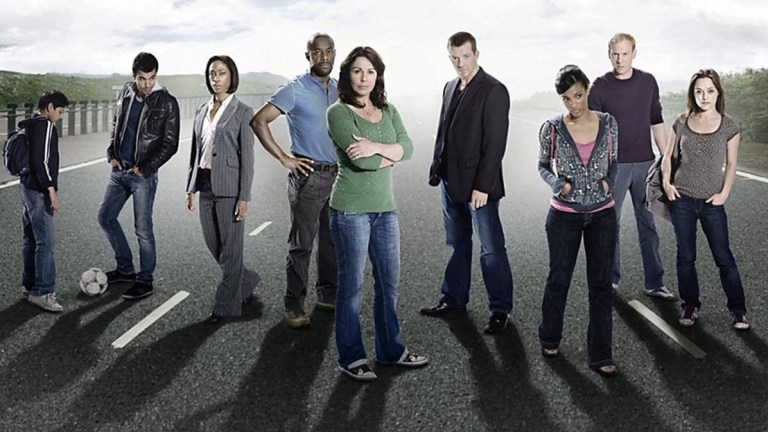The Best 2000s British Sci-Fi TV Series (Aside from Doctor Who)
Welcome to the decade in which UK sci-fi TV regenerated.

The 21st century is when everything changes.
British science fiction has been a lot of things. It was both cheesier and campier than its American counterpart, and yet also darker, grittier, and less afraid to tackle grown-up themes and bleaker outcomes. It had been a joke, and critically acclaimed, and it had all but died off except for some under-the-radar contenders.
And then something major happened: Doctor Who came back. It was always going to happen eventually – just look how many times The Tomorrow People has been remade. But Doctor Who didn’t just come back, it came back and became the biggest show in the country, on purpose.
Suddenly, the people in charge thought that maybe TV shows about ideas, and technology, and realities ahead of and besides our own could draw an audience, only this time they were taking it seriously and spending actual money on it. And websites like this one sprang up to write about it all.
It all started with a collaboration between Russell T Davies and Christopher Eccleston.
No, not that one.
The Second Coming (2003)
Disc-only, not currently available to stream
Is this science fiction? Is the Bible science fiction? That should keep you busy in the comments for a while. But it’s fair to say that Russell T Davies approached the idea of God’s son appearing on Earth (again) in this ITV two-parter as a science-fiction premise. And from here, there is a fearlessly head-on dissection of what it means for there to be a God, an afterlife, or a morality beyond the one we make up as we go along.
As the Messiah’s girlfriend, Judy (a bit of foreshadowing there), Lesley Sharp proves once again that her performance and Davies’ writing are always a gift to one another. But the real attraction for audiences today is that here we see the start of the doomed relationship between Davies and Christopher Eccleston, who plays the Second Coming himself, Man City fan Steven Baxter. They are such a good fit for each other, and it is immediately clear why Eccleston dropped Davies an email as soon as he heard Doctor Who was happening, and why Davies would go on to cast him.
Futurecast (2000)
Not currently available to stream
As we saw during our look at 90s British sci-fi shows, if you take Doctor Who off the telly then people will keep trying to invent it. In a similar vein, back when Charlie Brooker was just a particularly sweary videogame journalist, “Futurecast” followed in the footsteps of Play For Tomorrow as TV’s latest attempt at inventing Black Mirror (with one instalment, “Kidnap” even sharing a director with Bryn Higgins of “The Waldo Moment” fame).
It was a short and quickly forgotten series comprising three television dramas, each speculating on what life, and specifically, television might be like in 2012. Its predictions are a mixed bag – television transmitted exclusively through the internet? Yeah, pretty much. The UK becoming absorbed into a European superstate? If only.
Life on Mars (2006)
Stream on: BritBox (US & UK) BBC iPlayer (UK)
You know what there isn’t enough of on TV in 2024? Opening narration that explains the premise of the show every week. Life on Mars offers a classic of the genre. And it is a great premise – take the protagonist of your typical 21st century police procedural, soaked in forensics and political correctness (this being a thing we still pretended police did in 2006), and drop them into the world of the 1970s, when cops would have a beer for lunch, then find the nearest ethnic minority to the scene of the crime and beat them up until they confessed (this being a thing we pretended police no longer did in 2006).
It made for great TV, although as it went it did begin to suffer from Don Draper Syndrome, with the misogynist, racist alcoholic Gene Hunt getting an easier ride from the show as he became a poster boy for “Retrosexuals” (the favoured term at the time for men who like beer and not doing housework).
It would later have an 80s spin-off in Ashes to Ashes, by which time Hunt was positively cuddly.
Torchwood (2006)
Stream on: BBC iPlayer (UK); Max (US)
Torchwood took its name from an anagram designed to conceal the identity of Doctor Who tapes, but more than simply a way to keep printing Doctor Who money, it was Russell T Davies’ attempt to take the format of shows like Angel and see if they could translate to the UK (ignoring the fact that Ultraviolet had already perfected the form in 1998).
The series’ quality level was a rollercoaster. For two series it provided cheesy, campy monster-of-the-week action with oodles of swearing and shagging to show this Definitely Wasn’t a Kids’ Show. But then in 2009 the series launched Torchwood: Children of Earth and blew everything away. Davies is never better or nastier than when he’s showing how easily the UK can slip right into fascism, and Children of Earth is a peak of the form. When you watch the cabinet meeting where normal, non-cartoon-villain politicians quite sensibly justify handing over our poorest children to alien abduction, you’ll understand a lot more about how this country works.
Primeval (2007)
Stream on: NOW (UK); Hulu, Peacock (US)
But maybe you don’t need searing social commentary on the oppressive nature of power structures in the UK. Maybe you just need dinosaurs. The Walking with Dinosaurs franchise had proven to be a huge success story for the BBC – indeed, it was one of the factors that Davies’ pointed to when trying to pitch Doctor Who, but it was ITV who would eventually run with it in a show by Walking with’s creator Tim Haines.
Primeval concerned an elite team, including one of the founding S-Club members (Hannah Spearritt), investigating a scattering of time rifts over the Forest of Dean that kept releasing dinosaurs into schools, hospitals, and shopping centres. Eventually we would also see future lifeforms such as giant, blind bat-like predators. It ran for five series, with increasingly convoluted plots around various secret organisations threading through the Prehistoric-Creature-of-the-Week stories, before ending on a cliffhanger that was frankly, good enough to be an ending.
Jekyll (2007)
Disc and purchase-only; not currently available to stream
Much as The Second Coming works as a pretty good audition for Russell T Davies’ tenure of Doctor Who Big Boss, Steven Moffat’s retelling of/sequel to The Strange Case of Dr Jekyll and Mr Hyde is an excellent tour of everything he’d bring to the show.
Quippy dialogue, a plot that seems personally offended by the idea of linear chronology, a story that is ultimately a hymn to the magical powers of marriage, and a villain who’s a domineering woman in a black suit, it’s all here.
And because it’s Steven Moffat, it all comes together extremely well, not least as a fascinating look at how the logistics work when you are your own worst enemy.
Survivors (2008)
Disc and purchase-only; not currently available to stream
Doctor Who was not the only British sci-fi show to be revived in the noughties. It also saw a reimagining of Terry Nation’s Survivors, which we have covered before. It starred Julie Graham, who came to this series after the forgotten classic, Bonekickers, failed to get off the ground. A strong supporting cast and the previous year’s Foot-and-Mouth Disease outbreak gave the series an added edge of relevance.
Yet somehow it never quite managed to hit the same peaks of glorious bleakness that Terry Nation’s show achieved. Hot on the heels of shows like the new Battlestar Galactica, and Lost, the show had room to go for greater serialisation and darker storytelling than ever before, but it felt tame even compared to the 1990s drama The Last Train. The plots were episodic. The resident morally ambiguous character Tom Price (Max Beesley) would always be on the verge of doing something bad, but he’d always do the right thing by the end of the episode. It ended up feeling like a member of that most damned of British sci-fi subgenres; the cosy catastrophe.
Dead Set (2008)
Stream on: Netflix (UK); not currently available to stream in the US
2008 also saw the introduction of a far more modern apocalypse. Alongside Doctor Who, the noughties also saw a massive renaissance in the zombie apocalypse genre, and the UK was riding the crest of that wave. 28 Days Later and Shaun of the Dead in particular, opened shopping mall doors for hordes of movies about zombies (or “infected”) moving at speeds from a stumble to a sprint.
Enter: Charlie Brooker, his sweary videogame columns long behind him, with the genius idea of combining the zombie apocalypse with another idea that had been science fiction only a decade or so before – the Big Brother House.
But while critics at the time lauded the show as a devastatingly cutting satire on our reality TV-obsessed culture, the truth is that although Dead Set is gloriously grim and misanthropic, it is also a deeply affectionate bit of fan fiction.
Paradox (2009)
Disc-only, not currently available to stream
Starring Tamzin Outhwaite, because for a little while in the noughties, everything did, Paradox saw an astrophysicist receive messages that appeared to be from the future, warning of terrible catastrophes to come.
What followed was a disaster-of-the-week format that never quite lived up to its premise (a bit over a decade later The Lazarus Project would make a much better go of this) but still gave us a few decent hours of television in the meantime.
Misfits (2009)
Stream on: Channel 4.com, Sky (UK); Prime Video, Hulu, Peacock (US)
A lot of these series were following where Doctor Who had already been. That show had revealed there were rich pickings to be had for big, flashy drama that the whole family could watch on a Saturday evening.
Meanwhile, over on E4, Misfits was targeting the viewers that Channel 4 had always served well – students and young people watching telly after their parents had gone to bed. Five youths on community service who get struck by superpower-bestowing lightening and then murder their probation officer (in self-defence, it was fine).
The story saw them coming to terms with their own powers while tackling power-of-the-weeks they ran into (including my personal all-time favourite, “Lactokinesis”) and featured more dialogue about wanking than any other programme in any of these lists.
It also featured Robert Sheehan as the wisecracking dickhead character who would later turn out to have the power of immortality – a role he would play again in Netflix’s The Umbrella Academy.
